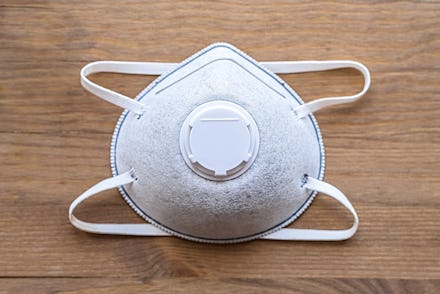Do expensive face masks really work better?

As it sinks in that we’ll likely be living with COVID-19 for a while, the face mask has transcended its intended purpose as a method of protection and evolved into a fashion accessory. Stylish masks fitted with filters and even straw holes for sipping cocktails may look better than regular disposable masks — but do fancy masks really work better? Are they more effective at protecting you, and others, from becoming infected with the novel coronavirus?
The short answer is no. “The bottom line is, a lot of these products are not science-based,” Suzanne Willard, a clinical professor and associate dean for global health at Rutgers School of Nursing, tells Mic. Without any data on them, it’s hard to judge their effectiveness. In other words, they're probably not worth their often high price tags.(This one from X Suit costs $120.) You're better off spending your money on something simpler and more functional.
Before we delve into the details, a reminder of why the Centers for Disease Control and Prevention recommends masks at all: They can curb the transmission of COVID-19 by acting as a barrier that helps keep the wearer from spewing their droplets onto the people around them. This way, an infected person, who may not even show symptoms, can avoid spreading the virus, and a healthy person can avoid inhaling virus-laden droplets.
This should go without saying, but masks with holes won’t help slow coronavirus transmission. Those festive masks with the straw holes allow not only drinks to pass through, but also respiratory droplets, Willard says.
Masks with filters have also emerged, but Willard points out that they need to be changed regularly, and replacement filters can be a significant recurring expense. And while evidence supports the use of N95 masks by health workers, these filtered masks aren’t the same thing. Willard hasn’t found any research backing their use.
Masks with filters have also emerged, but Willard points out that they need to be changed regularly, and replacement filters can be a significant recurring expense.
Some of the nicer masks are also made with so-called antimicrobial fabric, which is, again, probably more marketing than actual science, Willard says — that is, backed by research conducted independently of the manufacturer.
Willard also notes that many of these masks aren’t made with natural fibers. “That will increase the temperature and therefore make it more uncomfortable for the wearer. Then, they’ll take it off.” Likewise, snug, structured masks look chic, but might not necessarily fit your face.
When buying a mask, Willard says to prioritize comfort. Let’s face it: Masks can be itchy, stuffy, and annoying — but they’re essential. Anything you can do to minimize your discomfort will help ensure you'll actually wear it. Look for natural fabrics, like cotton or silk, to prevent overheating, as well as pleating, which will allow the mask to more easily conform to your face. And of course, choose good-quality products that don’t look like they’ll fall apart right away.
You can still look cute while doing your part to curb this pandemic. With a little digging, you can find a mask that's at least stylish enough, without compromising function.